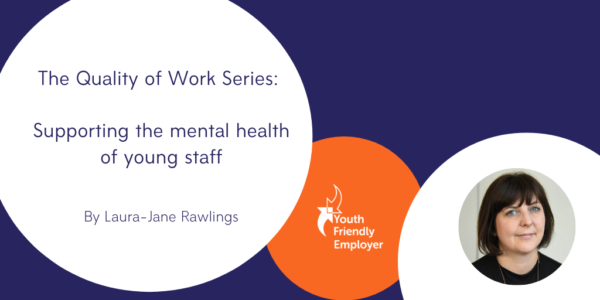We know that mental health is a growing concern for young people and the population as a whole. In our 2019 Youth Voice Census young people told us that mental health and anxiety were big barriers to employment for them. It was the first time in the Census data that mental health had featured so heavily in this way, but came as no surprise given the growing publicity of the issue.
Young people are finding it harder to manage their mental health and unfortunately the support services around them such as CAMHS (Child and Adolescent Mental Health Services) are under huge pressures with waiting times way beyond acceptable levels. We explored some of the policy issues around mental health support in our Manifesto for Youth Employment and it highlights the challenges faced by young people are complex and far reaching.
Schools are trying to do more to build young people’s capacity and awareness to deal with their own mental health and recognise when they need support. There are also a range of fantastic organisations who provide online, telephone and mentoring support to young people. But the scale of the problem is so big, it will take some time before there is enough support in place to meet the demands.
We know young people are moving in to their first careers without having had any support or the opportunity to develop the skills to manage their mental health in the context of work.
So what does this mean for employers?
Many employers are already embedding good mental health practices into their organisation, ensuring that they can support colleagues of all ages as and when it is needed. Mental Health at Work First Aid courses are a great way to build the knowledge within HR/management teams to ensure that the right support and processes are in place.
I think that there also has to be a clear acknowledgement that younger staff may need more guidance and support to navigate these policies and procedures. They may be experiencing new pressures and may not have experience on their side to help navigate some of that. It is worth considering the role that buddies and mentors can have in supporting young people not just as they enter the workplace but as they develop through their career too. Quality training and procedures are vital to ensure that line managers know how they can support young people and know where to access help and support they need too.
Good quality employment
The Good Youth Employment Standards are a comprehensive framework of what good quality youth employment is. Through this framework organisations are encouraged and supported to review their induction and onboarding process, ensuring that there is an open and supportive culture where people can talk about their mental health needs and know that they will not be judged or be at risk because of it. The framework also encourages employers to put in place mentoring or peer support which, when done well, can be a great leveller that can identify potential problems but also solutions.
It is important to remember that young people might not be able to articulate how they feel or what they need, sometimes not even recognising that they have a problem so getting to know them on an individual level is key. The framework provides practical steps and guidance on how to put these processes in place and the benefits to your business. I would also encourage you to read some of the articles young people have written about the effects of their mental health on their lives so you can see through the lens of the people you want to help.
Is it the job of an employer to support a young person’s mental health?
As a parent and the CEO of Youth Employment UK there is no doubt in my mind that it takes a village to raise a child. I believe that it is all of our jobs to create the best environments for young people to thrive in. For those wondering about their bottom line there is a business driver too, we need to have productive workforces and having staff who are not getting the support and time they need will only harm productivity.







